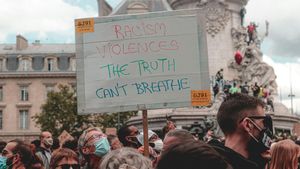The COP29 Climate Summit kicked off on November 11, 2024, amid swirling concerns over the potential impact of Donald Trump’s re-election on global climate negotiations. Leaders from around the world gathered in Baku, Azerbaijan, to address pressing climate issues, but many attendees couldn't shake feelings of apprehension and uncertainty related to the future of international cooperation on climate change as the former president prepares to take office again.
Unlike 2016, when Trump’s victory sent shockwaves through global climate interactions, this time many participants have already experienced the ramifications of his policies. Trump is expected to revive his past promises to pull the U.S. out of the Paris Agreement and dismantle President Biden’s climate landmark legislation. Concerns arose from the knowledge gained from past experiences, with various leaders from across the globe expressing anxiety about how Trump might deepen the climate crisis.
“We have seen this story,” said Catherine McKenna, Canada’s former climate minister, referencing the previous uncertainties during Trump’s first administration. “When it happened before, we saw the world step up.” This sentiment highlights a growing awareness among climate leaders about having to adapt to competing interests and pressures as negotiations proceed at COP29.
At the heart of the climate summit is the ambitious target to establish the New Collective Quantified Goal (NCQG), which is aimed to provide at least $1 trillion annually to developing nations bearing the brunt of climate change. Trump’s stance poses significant challenges to achieving this target due to fears of dwindling financial support following his anticipated withdrawal again from international climate commitments.
Climate diplomats warn of the serious consequences of U.S. retreat; key countries like China are poised to assume greater responsibility on the global stage, which could weaken the established order within climate negotiations. Yet, China’s own climate envoy Liu Zhenmin expressed concerns about the uncertainty surrounding U.S. climate policy under Trump. “Everybody's concerned about next steps,” he noted, reflecting the uneasiness shared across various negotiating parties.
The COP29 summit arrives at the crossroads of geopolitical tensions, with African nations prominently advocating for climate finance to scale up dramatically. Delegates from African countries have called for $1.3 trillion annually to support the transition to renewable energy and climate adaptation, dramatically increasing the current funding levels. Seyni Nafo, the spokesperson for the African negotiators' group, underscored the catastrophic impacts of climate change currently faced by developing countries, emphasizing the urgent need for increased, accessible funding for efforts aimed at addressing the impending climate crisis.
“We don’t want this goal to be just a number—without substance,” said Tosi Mpanu Mpanu, negotiator from the Democratic Republic of Congo, as he articulated the fierce need to translate pledges and commitments from past summits directly to needed finance.
While discussions progress, the realities of recent environmental crises remain at the forefront of talks. The 2024 climate events have brought devastating cyclones to southern Africa, extreme droughts to the Horn of Africa, and intense flooding to various regions. These occurrences have spurred the African nations to demand not only adaptation funds but also compensation for loss and damage due to disasters fueled by climate change impacts they had little part in causing.
Drawing focus on the needs of countries most vulnerable to climate impacts, the summit's goals extend beyond financial commitments. The overall expectation is for countries, particularly wealthy nations, to step up and allocate significant financial resources without the burden of debt to support adaptation efforts.
The urgency of mobilizing these funds is compounded by mounting debt levels among developing countries, which complicate their ability to respond to climate change effectively. A call for pressing nations to source more grants than loans was made clear. “If mobilized, the funds must have accessible disbursement methods because we often can’t access money even when it is there,” Mpanu Mpanu added during his address.
The summit faces questions of which nations will provide the level of financial backing needed to address the global climate crisis, particularly as pressure mounts to finalize agreements at the COP29. Global entities, including businesses and state governments, are being urged to maintain their commitments to addressing the climate crisis, even as uncertainty looms under Trump’s anticipated administration.
Despite the tumultuous atmosphere, there are glimmers of hope as leaders reflect on the resolve shown by nations facing similar conditions during Trump's first term. Many states and local governments within the U.S. are positioning themselves to work collaboratively to fill any gaps left by federal detachment, showcasing the grassroots initiatives gaining traction to bridge climate commitments.
Climate action proponents argue for sustaining momentum, stressing the need necessitated by dire climate realities. Observers are watching closely as negotiations at COP29 progress, with hopes this summit can lay down definitive commitments during this pivotal meeting. Former climate discussions proved fruitful through sustained pressure, with coalitions such as the Pacific island nations striving for ambitious climate goals amid rising sea levels.
Simultaneously, the climate finance attendance at the summit has seen significant discourse surrounding ‘loss and damage,’ which entails funding for countries affected by the catastrophes resulting from climate change. The conversation pushes toward ascertaining how funds meant for recovery can become operational and who will be held accountable for contributions.
Climate justice advocates emphasized the importance of direct actions to protect vulnerable groups and questioned whether COP29 can match the urgency of the climate crisis's realities with actionable funding outcomes. The road map toward achieving the NCQG, alongside increasing adaptation finance due to evident climate disasters, offers avenues for progressing the discussions amid challenging political landscapes.
Trump’s election and the updates on the standing climate policies have set the stage for tumultuous negotiations at COP29. With upcoming gatherings among world leaders, few know how they will balance efforts to combat climate change against rising political tensions. The pressure to articulate meaningful guiding principles and solidifying collective action is more substantial than ever. While this moment may evoke anxiety, some leaders retain hope, willing to confront the climate challenge collectively as the summit continues—daring to chart progress against all odds.



